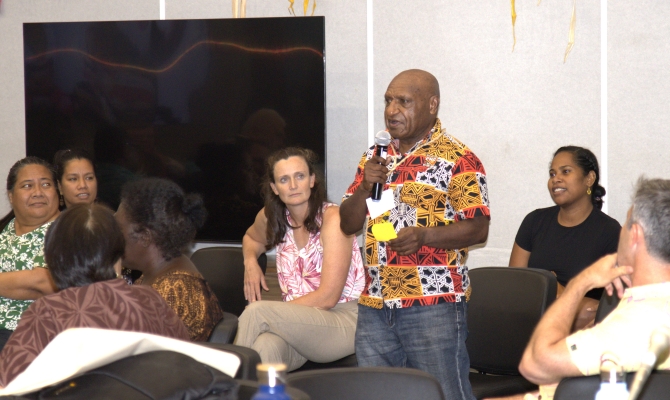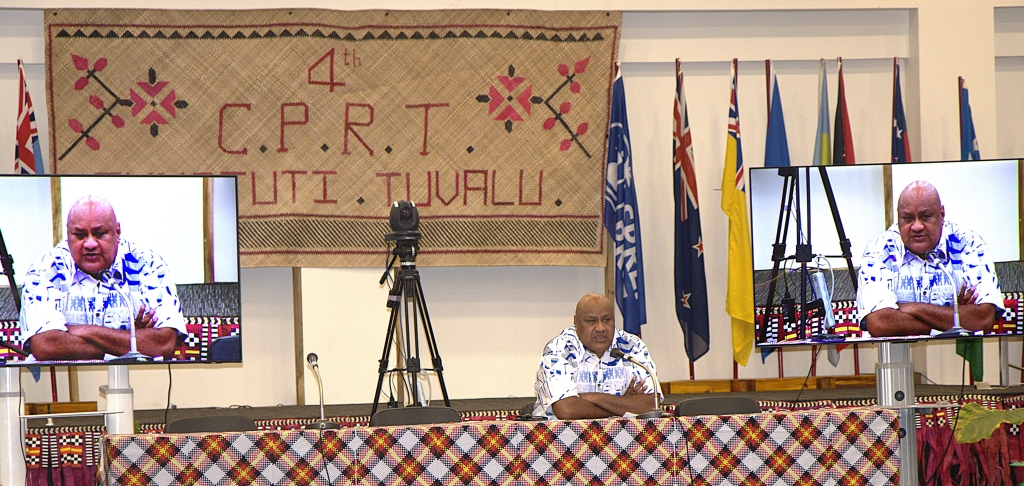
8 August 2024, Funafuti Tuvalu - Waste management and pollution control remains one of the most pressing environmental issues facing the Pacific, a region already struggling with the impacts of the triple planetary crises of climate change, biodiversity loss and pollution.
As the reliance on consumer goods rapidly increases, managing different types of wastes such as e-waste, healthcare waste, plastic, abandoned cars, disaster waste and other types pose a real threat to livelihoods of Pacific communities.
In response, the Secretariat of the Pacific Regional Environment Programme (SPREP) following consultation with all its member countries launched a comprehensive long-term strategy for integrated sustainable waste management and pollution prevention and control called the Cleaner Pacific 2025.
The Pacific Regional Waste and Pollution Management Strategy 2016–2025 provided a strategic management framework to address waste, chemicals and pollutants to reduce associated threats to sustainable development of the region. It also focused on strengthening institutional capacity, promotion of public-private partnerships, implementation of sustainable best practices, development of human capacity, dissemination of outcomes and experiences, and promotion of regional and national cooperation.
With a year remaining to implement the 2016-2025 framework, steps are afoot to prepare the next blueprint to continue the work to improve the management of waste and pollution to safeguard Pacific communities.
On Thursday in Funafuti Tuvalu, delegates attending the Fourth Clean Pacific Roundtable (4CPRT turned their attention to envisioning what the Clean Pacific 2035 would look like.

SPREP’s Director General, Mr Sefanaia Nawadra, who addressed them, acknowledged that significant progress has been made by all Pacific countries in managing waste since the inception of CP2025.
Improvements for example have been noted in the rehabilitation of landfills and the improvement of garbage collection services in many countries. A number of countries have also taken up initiatives where substantial volume of waste materials have taken offshore, which has relieved the pressure of limited landfill space. But there is still a lot of work to be done and planning the next framework is a critical step.
“As we look towards the next iteration of the framework, we need to keep in mind that this is long term work, it goes beyond the lifetime of projects and initiatives we have taken,” he said. “We need to set within the framework what we want to achieve in the short-term, medium-term, and what we want to achieve at the end of ten years, or whatever time frame you set yourselves.”
According to the Director General, the success of any regional or global framework comes down to the work at the national level, which is why the input from countries attending the 4CPRT is important.
“I know some of you have something similar to the Clean Pacific Roundtable in your countries but for those of you who don’t, it might be a good idea to start thinking about having something similar.”
He also encouraged the member countries to be inclusive.
“We need as much help as we can to get this done. It adds more value when you come to regional and global gatherings when you can speak as someone who represents the whole range of parties and issues at the national level.”
SPREP’s mandate is to promote cooperation in the Pacific region and provide assistance in order to protect and improve its environment and to ensure sustainable development for present and future generations. Mr Nawadra reassured countries of this continued support.
“The commitment from SPREP is that we are available to help. SPREP is committed to working with you to strengthen what we already have at the regional level because this will also strengthen how we engage globally.”
Lastly, Mr Nawadra urged the delegates to seize the opportunities available from the current global focus on plastics, as the work of the Intergovernmental Negotiating Committee to develop an international legally binding instrument on plastic pollution, including in the marine environment ramps up.
“For the first time the issue of waste management has been elevated to the Pacific Leaders Forum. This is a significant opportunity we did not have so we need to seize this opportunity to not only highlight the issue of plastics but also use the issue of plastics to highlight everything else about waste management and pollution,” he said.
“We often hear complaints about the lack of political will, this is an opportunity for us to impact our political leaders, communicate to them what we need to do in a way they understand. We also need to keep the integrated nature of the framework because we need to convey to the decision makers and members of the public in a clear way that the issue of waste cuts across both land and sea.”
The discussions on topics to assist with developing the new Clean Pacific 2035, or plus, was the sole focus of the fourth day of the 4CPRT. This is the first step to be followed by national consultations. A final report will be submitted for the consideration of the 32nd SPREP Meeting in 2025.
The Fourth Clean Pacific Roundtable (CPRT) facilitated by the Secretariat of the Pacific Regional Environment Programme (SPREP) is hosted by Tuvalu from 5 – 9 August 2024.
The Roundtable is intended to provide a vehicle to disseminate outcomes, promote regional collaboration and resource complementarity, and expand networking opportunities to assist Pacific Island countries and territories in the delivery of safe and sustainable waste management practices. It will also prevent pollution-related issues that impact the health of the ocean and communities within the region.
It is attended by the Cook Islands, Fiji, French Polynesia, Kiribati, Marshall Islands, Nauru, Niue, Palau, Papua New Guinea, Samoa, Solomon Islands, Tonga, Tuvalu and Vanuatu.
For more details and the programme, click: https://www.sprep.org/4th-clean-pacific-roundtable